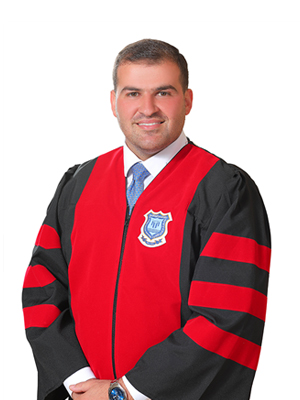In 2024, Dr. Saddam Al-Awaisheh redefined the meaning of student-centred teaching by transforming the academic journey of a blind law student into a model of inclusive and humanistic education. His work with Mohammad Al-Ghara challenged conventional teaching practices and demonstrated how empathy and innovation can converge to create meaningful change in higher education.
Dr. Al-Awaisheh consistently evaluates and improves his teaching to meet the evolving needs of students. Faced with the challenge of teaching legal concepts to a non-sighted student, he created a fully audio-based course, recorded in his own voice. This went beyond accommodation, it reimagined content delivery to strengthen legal reasoning, ethical awareness, and communication skills. The student was not merely supported to pass but empowered to practice law with confidence and clarity.
What truly distinguishes this case is the depth of engagement. Dr. Al-Awaisheh took personal responsibility for the student’s academic and emotional growth. He designed customized assessments, arranged for legal writing assistance, and ensured full participation in classroom discussions. Once limited by social and physical barriers, the student rose to become one of the most articulate voices in class. His transformation sparked university-wide discussions on inclusive pedagogy and inspired colleagues to reexamine teaching models.
This case also marked a turning point in Dr. Al-Awaisheh’s professional development. Building on structured reflection, peer consultation, and student feedback, he explored advanced e-learning platforms and integrated artificial intelligence tools to enhance content personalization and accessibility. Seeking deeper student insight, he completed a professional course in body language interpretation to better understand non-verbal feedback—particularly from students with disabilities. He later led a faculty-wide workshop on inclusive teaching, furthering his role as a mentor and changemaker.
The impact extended beyond the classroom. Several peer institutions reached out to learn from this model, and the case was presented in development seminars and student affairs forums. The faculty’s inclusive approach, pioneered through this experience, has since informed broader strategies across the university.
Dr. Al-Awaisheh’s approach fostered not only academic achievement but also dignity, self-belief, and readiness for professional life. His classroom is not defined by physical structures or traditional assessments, but by belief in the transformative potential of every learner. His work has proven that personal leadership can be a more powerful catalyst for institutional change than policy alone.
While he has long supported students from diverse and disadvantaged backgrounds, this case represents a paradigm shift, where one professor’s values, creativity, and resolve dismantled barriers and opened pathways toward excellence. As his student, Mohammad Al-Ghara, stated: “Dr. Al-Awaisheh is not just my professor; he is the architect of hope in my life.”
This is not a story of accommodation; it is a blueprint for transformation. Dr. Al-Awaisheh teaches not only the law, but how to live with purpose, clarity, and dignity.








